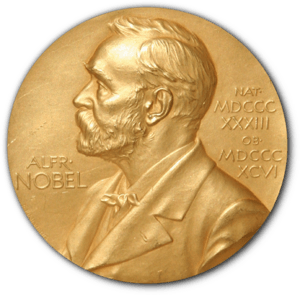List of Nobel laureates facts for kids
The Nobel Prizes are super important awards given out every year. They honor people and groups who have made amazing contributions to the world. These prizes cover different fields like chemistry, physics, literature, peace, and medicine.
A famous inventor named Alfred Nobel started these prizes with his will in 1895. He wanted to make sure that people who helped humanity were recognized. The Nobel Foundation manages these awards. Later, in 1968, Sweden's central bank added another prize. This one is for great work in economics.
Each person or group who wins a Nobel Prize is called a Nobelist or laureate. They get a shiny gold medal, a special diploma, and a sum of money. The amount of money changes each year. For example, in 2023, winners received about $1 million US dollars!
What are the Nobel Prizes?
Different groups are in charge of giving out each Nobel Prize. The Royal Swedish Academy of Sciences handles the prizes for Physics, Chemistry, and Economics. The Swedish Academy gives out the Literature Prize. The Karolinska Institute awards the Prize in Medicine. And the Norwegian Nobel Committee decides who wins the Peace Prize.
Winners receive a medal, a diploma, and money. The money amount has changed over the years. For instance, in 1901, the first winners got about 150,782 SEK. That's worth a lot more today! In 2017, winners received 9 million SEK. The awards are given out in Stockholm, Sweden, every year on December 10th. This date is special because it's the anniversary of Alfred Nobel's death.
Sometimes, a Nobel Prize isn't given out. This can happen if there are big world events, like World War II (the Nobel Prize wasn't awarded between 1940 and 1942). It can also happen if there aren't enough good nominations. When a prize isn't awarded, the money goes back into the funds for that specific prize.
Who are the Nobel Winners?
From 1901 to 2017, the Nobel Prizes and the Economics Prize were given out 585 times. This means 923 people and organizations won. Some people even won more than once! In total, 892 different individuals have won, including 844 men and 48 women. Also, 24 organizations have received a Nobel Prize.
It's interesting to know that some Nobel winners were not allowed to accept their prizes by their governments. For example, Adolf Hitler stopped four Germans from accepting their awards. The Chinese government also stopped Liu Xiaobo from accepting his Peace Prize in 2010. The Soviet Union pressured Boris Pasternak to turn down his Literature Prize in 1958.
Some winners even received their Nobel Prize while they were in prison or detention. This includes Liu Xiaobo, Carl von Ossietzky, and Aung San Suu Kyi. On the other hand, two Nobel laureates chose to decline their awards. Jean-Paul Sartre (Literature, 1964) turned down all official honors. Lê Ðức Thọ (Peace, 1973) declined his award because of the difficult situation in Vietnam at the time.
Seven laureates have won more than one prize. The International Committee of the Red Cross has won the Nobel Peace Prize three times, which is more than any other winner! The UNHCR has won the Peace Prize twice. John Bardeen won the Nobel Prize in Physics twice. Frederick Sanger and Karl Barry Sharpless each won the Nobel Prize in Chemistry twice.
Two amazing winners received prizes in different fields. Marie Curie won for Physics and then for Chemistry. Linus Pauling won for Chemistry and then for Peace. Out of all the individual winners, 48 have been women. The first woman to win a Nobel Prize was Marie Curie in 1903 for Physics. She was also the first person ever to win two Nobel Prizes!
List of Nobel Winners
List of laureates
|
Contents
|
How Nobel Winners are Chosen
The Nobel Committee keeps the names of nominees a secret. They don't tell the media or even the people nominated. So, if you hear names guessed for the award, it's just a guess. Or it might be from someone who secretly submitted a nomination.
After 50 years, the Nobel Committee makes all the nomination information public. This means researchers can look back at who was considered for the prizes. This rule helps keep the selection process fair and private for a long time.
See Also
 In Spanish: Anexo:Ganadores del Premio Nobel para niños
In Spanish: Anexo:Ganadores del Premio Nobel para niños
- List of Nobel laureates by country
- List of Nobel laureates by university affiliation
- List of female Nobel laureates
- List of nominees for the Nobel Prize in Literature
- List of nominees for the Nobel Prize in Chemistry
- List of nominees for the Nobel Prize in Physics
- List of female nominees for the Nobel Prize
- List of individuals nominated for the Nobel Peace Prize
- List of organizations nominated for the Nobel Peace Prize
 | DeHart Hubbard |
 | Wilma Rudolph |
 | Jesse Owens |
 | Jackie Joyner-Kersee |
 | Major Taylor |



